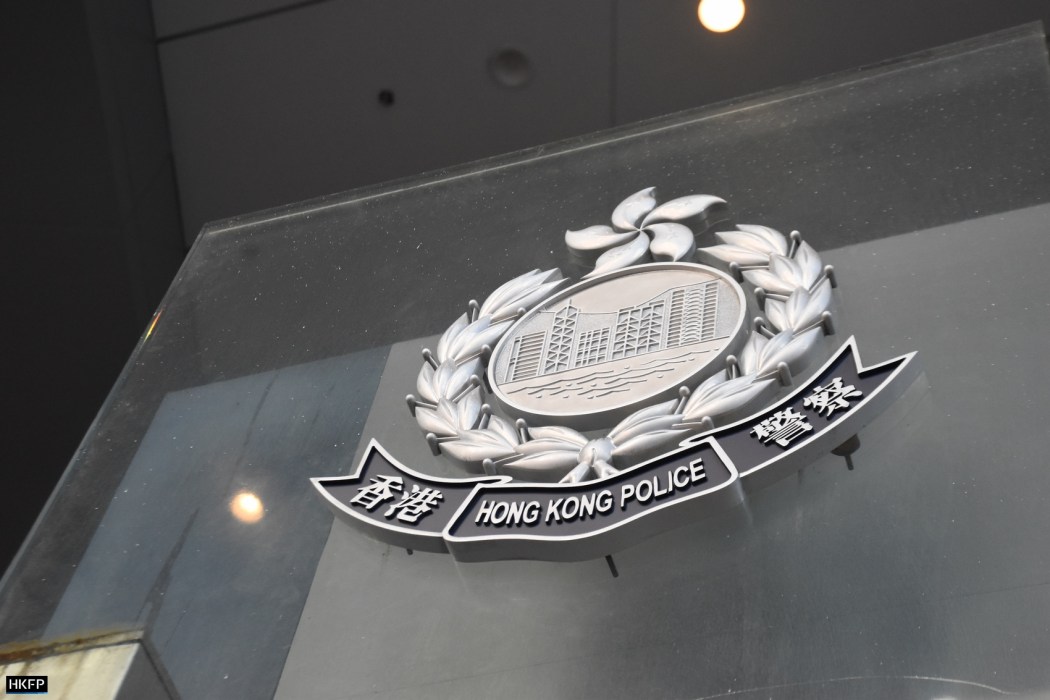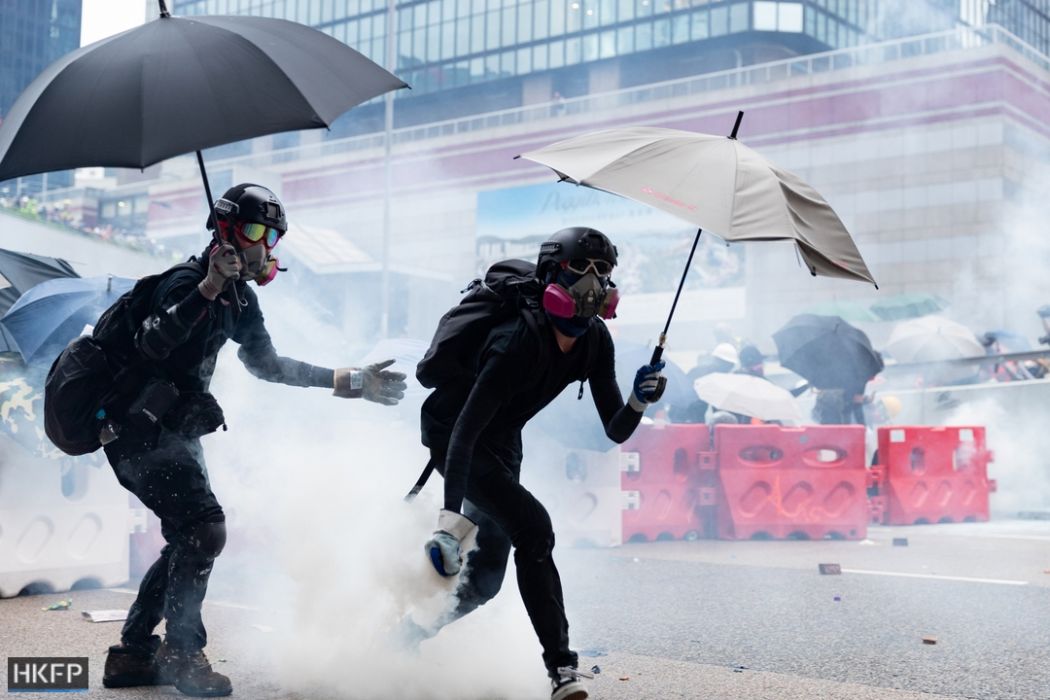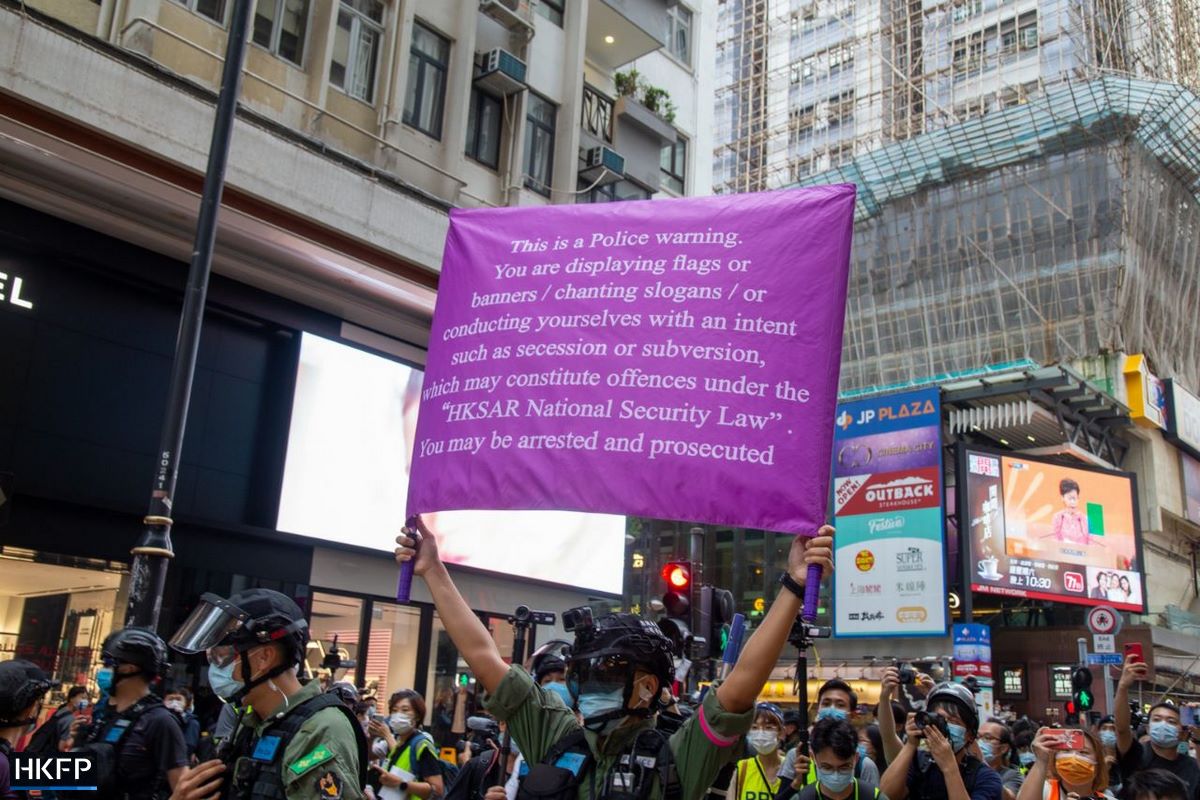A Hong Kong professor left the city after hearing that his university allegedly contacted the police over an article he had written about the 2019 protests, joining a growing number of artists and academics emigrating amid concerns about the city’s declining freedoms.
The university, however, has denied making any such report.

Justin Wong, who worked at Hong Kong Baptist University’s (HKBU) visual arts department, told HKFP that he left the city within days of hearing in November 2021 that police had allegedly been notified about the article produced for an academic magazine.
“The school did not tell me anything. I just heard from different unofficial channels that the police [were] called,” Wong, who is now in the UK, said.
Written in the wake of the anti-extradition bill protests, Wong’s article analysed the role that visual symbols – such as yellow umbrellas, the masks from dystopian film V for Vendetta and a pig mascot from popular forum LIHKG – played in the months-long demonstrations.

The article’s design featured popular protest slogan “Liberate Hong Kong, revolution of our times,” with the characters replaced with abstract-looking blocks. The slogan has been criminalised under the national security law.
Wong told HKFP he had heard that the alleged decision to notify the authorities about the article was a “high-level” one made by HKBU top management. However, HKFP was unable to independently verify that a formal police report was made, and police said they could not locate the case.
Responding to an enquiry from HKFP about the purported police report, HKBU said “the University has neither filed any report to the Police nor referred it to related authorities for handling.”

The university said it “upholds academic freedom and strives for providing a proper research, teaching and learning environment for staff members and students while ensuring all activities are in full compliance with laws and regulations.”
Wong, who began teaching at the university in 2008, called the alleged report a “complete betrayal” and an act of political censorship. “It’s a place I worked at for over 10 years. I was very involved with the university, and I really loved it,” he said.
As of Wednesday morning, he was still listed as a member of academic staff on HKBU’s Academy of Visual Arts’ website.

Beyond academia, Wong was also a regular political cartoonist for Ming Pao. His work drew controversy in September 2021, when the police accused him of “slandering” Junior Police Call – a youth outreach group run by the force – in a comic strip. Wong later apologised.
Magazine recall
Wong’s article was featured in an academic magazine produced by Shared Campus, an initiative comprising international higher-education arts institutions. The former HKBU professor was one of around two dozen contributors to the inaugural issue of the magazine – seen by HKFP – which explored the theme of “contamination” in the context of political and social events.
HKBU is part of the initiative alongside schools including City University of Hong Kong, Singapore’s LASALLE College of the Arts, and Switzerland’s Zurich University of the Arts.
After distributing the magazine to participating institutions in November 2021, Shared Campus was said to have attempted to recall copies, people familiar with the matter told HKFP on condition of anonymity. Contributors were apparently told it could not be circulated.

Initially, Wong said people were “very surprised” that his article had triggered controversy.
“My piece is a very descriptive, short article. It’s an academic article,” Wong said. “[Yet] it was a consensus that the magazine could no longer be published.”
The professor told HKFP he was not contacted by the police.
Sources also said that, when addressing the incident with the magazine’s contributors, Shared Campus flagged two other Hong Kong articles that could also be “problematic.” Like Wong’s, they were related to the 2019 protests.
Shared Campus declined to discuss the incident. “The magazine was not in public circulation and we respect the confidentiality among our partners in this case,” Shared Campus told HKFP.

A person with knowledge of the incident expressed concern that the university was limited by the political atmosphere in the city.
“How can the university encourage critical thinking and an egalitarian society when its faculty are working under such authoritarian constraints?” they told HKFP.
Fears for academic freedom
Concerns about dwindling academic freedom in Hong Kong have been growing since a national security law was imposed by Beijing in June 2020 following months of protests.
The demonstrations were sparked by opposition to a controversial extradition bill that would have allowed the transfer of fugitives to mainland China for trial, and soon morphed into a wider, occasionally violent movement against the Hong Kong and central governments.

Critics of the law say it has been used to stifle dissent, while authorities maintain it has restored peace and stability in the city.
Since the legislation was enacted, universities have removed tributes to the 1989 Tiananmen crackdown – a heavily censored topic in mainland China – in which hundreds are believed to have been killed when Beijing authorities opened fire on pro-democracy protesters. National security courses have also been introduced at educational institutions and student unions have been forced to disband under pressure.
Last January, members of a student publication at HKBU collectively resigned citing staff safety concerns and interference from the university after receiving complaints. A month later, the World Press Photo exhibition – which was set to take place at HKBU and included shots from the 2019 protests – was axed over security concerns.
Wong said he had no plans to return to Hong Kong under the current political climate, adding that working in academia in the city now – especially for those researching societal or political issues – was like “walking on a tightrope.”
“The way it is going, people like me aren’t allowed to stay in Hong Kong,” he said.
Support HKFP | Policies & Ethics | Error/typo? | Contact Us | Newsletter | Transparency & Annual Report | Apps
Help safeguard press freedom & keep HKFP free for all readers by supporting our team

LATEST FROM HKFP
HKFP has an impartial stance, transparent funding, and balanced coverage guided by an Ethics Code and Corrections Policy.
Support press freedom & help us surpass 1,000 monthly Patrons: 100% independent, governed by an ethics code & not-for-profit.










